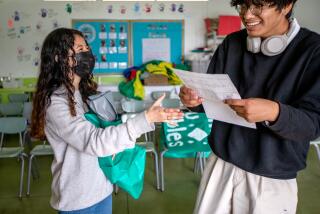Swiss Drug Company Awards UCSD $20 Million to Study Arthritis
- Share via
Ciba-Geigy Corp., a Switzerland-based drug and chemicals giant, has awarded UC San Diego’s School of Medicine a $20-million grant to study the causes of arthritis, a disease that afflicts an estimated 37 million Americans, university officials said Tuesday.
The grant, the largest ever received by the medical school from a single commercial concern, will fund a 50-member research team that will further solidify the growing reputation of UCSD’s Institute for Research on Aging. The arthritis research team is being assembled by Dr. Dennis Carson, a Scripps Clinic & Research Foundation scientist who will move to UCSD’s medical school along with a significant number of Scripps researchers.
No cure has yet been found for arthritis, and scientists have only begun to explore what causes the painful disease. Arthritis victims now depend largely on physical therapy and drugs to reduce inflammation of the joints caused by arthritis.
Ciba-Geigy created the research agreement with UCSD with the expectation that researchers will help speed “new chemical entities from the lab to bedside,” said Dr. Frank Douglas, senior vice president of research for the Ciba-Geigy pharmaceuticals division. Ciba-Geigy, which last year introduced an anti-inflammatory prescription drug used by arthritis patients, has funded three other research organizations around the world that are studying the disease.
Carson’s team hopes to learn more about the cellular and molecular biology responsible for rheumatoid arthritis and osteoarthritis, the two most common forms of arthritis, as well as other autoimmune diseases. One of five Americans suffers from osteoarthritis and about 2% of the population has rheumatoid arthritis.
Carson described the grant, which includes $6.5 million for laboratory space and $1 million annually for up to 10 years, as important because, “up until now, research resources have been quite limited . . . and there’s not going to be a major breakthrough by a scientist working alone in a back room.”
The grant is “obviously a very significant amount of money,” said Dennis Bowman, a spokesman for the Atlanta-based Arthritis Foundation. “If it’s not the largest grant by a corporation (to a research group), it’s certainly one of the largest. And the 50-person team could be the largest in the country to work specifically on arthritis.”
Bowman described Carson as “one of the leading arthritis researchers in the nation.” Carson, who won the foundation’s national research award in 1987, has been associated with the foundation since 1974. Carson regularly “helps us identify the best and most promising research to receive (foundation) funding,” Bowman said.
The UCSD research team hopes to uncover the genetic factors that evidently “make people susceptible” to the development of arthritis, Carson said. It also hopes to learn what environmental factors trigger the disease.
“We don’t believe that arthritis is an inevitable part of the aging process,” Carson said. “For example, (evidence suggests that) until 1750, rheumatoid arthritis didn’t exist in Europe.”
Carson’s team will join other arthritis researchers now working at the UCSD Institute for Research on Aging. Scientists at the institute, which soon will move into its own building on UCSD’s La Jolla campus, hope to prove that “old age need not be synonymous with disease and disability,” said institute Director J. E. Seegmiller.
The research agreement announced Monday gives Ciba-Geigy’s pharmaceutical division the right to license “intellectual knowledge and properties” that its researchers can use in their search for an arthritis cure. However, the University of California system will retain patents resulting from research conducted through the program.
Gerard N. Burrow, a UCSD vice chancellor and dean of the medical school, said the grant will not “compromise academic freedom” because university researchers will maintain control over their own research. Carson acknowledged that he initially had “certain academic prejudices” against the alliance, but that those doubts were “quickly dispelled” by Ciba-Geigy’s intent to give UCSD researchers “complete academic freedom.”
In an unusual twist, the Ciba-Geigy research funds were directed to the university, rather than to an individual researcher, Burrow said. That kind of funding arrangement has become more important because federal funding for health research is being cut back, Burrow said.
The agreement with Ciba-Geigy, which took a year to create, will serve as a “role model” for an expected wave of research agreements that will link universities and corporations, Burrow said. Burrow said the agreement announced Tuesday will “facilitate the transfer of biotechnology to industry.”
“The university provides a fertile environment for the basic research to answer fundamental questions about disease,” Burrow said. “We also have a responsibility to make the results of scientific advances available to the public.”






